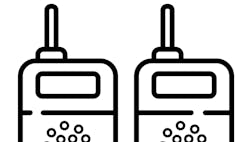Instant communication: How two-way radios improve dental practice efficiency
By Dave McClintic
Dentistry surprises us with exciting and new technologies every day. Everything from new x-rays to 3-D printers are helping doctors conduct new procedures that improve the lives of their patients. However, one tool for improving a practice’s communication and efficiency is not new technology—I’m talking about two-way radios.
When I started my two-way radio business in 2014, I did not think about dental offices as an established market. But year-after-year more dentists and front office managers asked me about walkie-talkies and radio headsets.
The fact is, two-way radios are an effective and simple way to increase the efficiency of your practice. Here are a few reasons how two-way radios can benefit your team’s communication.
Improve doctor to front office communication
The ability to quickly check in patients is key to running a successful practice. Two-way radios help the front office quickly communicate with the hygienists to let them know which patients are coming in and out of the office. Radio communication prevents the “little trips” through the office from occurring. If the doctor or team have a front office question, they’re able to instantly communicate with each other via the two-way radio.
Reann Decker works in the front office of Mitchell Dental in Scottsdale, Arizona. She has worked in offices that use radio communication and those that do not. She said the offices that use two-way radios operate more effectively.
“The radios help us a lot with time efficiency,” Decker said. “Getting ahold of someone in the back office is much easier, and they can let me know about treatment changes without having to come up to the front. When I worked in offices without radios, we were constantly wasting time walking around to find people.”
Decker went on to say that these “small meetings,” as her office called them, kept the team from actively helping patients. One or two of these “meetings” may not take much time out of the day, but for a large practice these meetings add up.
Some doctors believe that using two-way radios means they have to spend the day listening to chatter that does not concern them. This concern can be addressed by asking your radio provider to place the doctor on his or her own private channel. A private channel means the dentist hears only conversations for which he or she is needed.
Increased patient time
For many patients, sitting in a dental chair is not the most enjoyable experience. They want to get in, get their dental work done, and get out. A hygienist or dentist leaving the patient to have a question answered will not get the patient out of the chair faster. The ability to stay with the patient while still communicating with the team can bring a level of comfort to an otherwise nerve-wracking appointment.
“No one likes to be left alone at the dentist office,” Decker said. “Two-way radios help us get our questions answered without having to leave anyone alone in the chair.” The need to stay with a patient is even more crucial if the doctor is dealing with an emergency, and with radio communication, emergency help is just a button push away.
Quick tips
If you believe two-way radios for your dental practice are a good option, there are a couple things you need to look for. Make sure you look for two-way radios that are easy to turn on and off. I recommend a large push-to-talk button. These are the easiest to use for multi-tasking medical professionals. It is also important to find a vendor who is readily available to help with everything from the setup of your radios to the technical questions you may have. A strong network of support after the sale is something any good vendor will provide.
Dave McClintic is the owner of HQ98.com. He has sold and consulted about two-way radios to dental clinics across the country.
